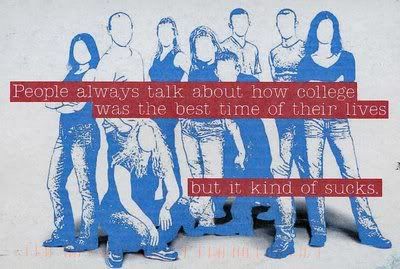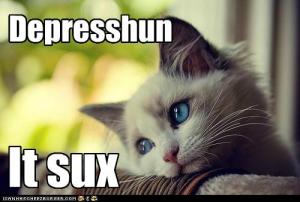About five years ago, we read Nathaniel Hawthorne’s The Scarlet Letter in my 10th grade English class. In order to facilitate our understanding of what it must’ve been like for Hester Prynne to walk around with a letter “A” pinned to her clothing, our teacher had us come up with our own biggest flaws and spend a day wearing a decorated letter to represent them. When people inevitably asked what the letters were for, we could explain in as much or as little detail as we wanted.
Of course, most of the kids in my class chose fairly innocuous “flaws”–perfectionism, laziness, stuff like that.
But I chose insecurity.
I wouldn’t be diagnosed with depression for nearly three more years, but all the bits and pieces of my forthcoming diagnosis were already starting to fall into place. Just a week before our letter-wearing assignment, I’d been somewhat unceremoniously dumped by my first real boyfriend, whom I’d told several weeks before that, in tears, that I can’t be happy if I don’t like myself. (The poor guy had no idea how to respond to that–it wouldn’t be until my sophomore year of college that I found a group of friends who did–and I suppose I can’t blame him for running away from my teenage self like a man on fire.)
Although I didn’t know it at the time, I’d accidentally stumbled upon a huge predictor of poor mental health–an unstable sense of self. I had no idea who “I” was apart from what people told me. My friends thought I was overdramatic and overemotional, so I was. My parents thought I was immature, so I was. A guy at school made fun of my big ass, so I was fat. I was pretty and intelligent only because (and only as long as) my friends and family told me so.
Lacking my own independent and stable ideas of who I was, I ran to people for affirmation. They would provide it, and I’d feel satisfied for a short time. I thought that that’s how life was meant to be.
When someone comes to you expressing thoughts of insecurity, it’s natural to want to “fix” everything for them by assuring them that their fears are baseless. What are you talking about, you’re so thin! Of course you’re smart! Guys would be lucky to date you!
But here’s the problem–even if your assertions are absolutely correct, you’re not really doing the person any favors by making them. Rather than making their self-concept subject to the people who bring them down, you’re only making it subject to you and your affirmation.
My advice? Challenge your insecure friends or loved ones to define themselves through their actions, not through arbitrary labels like “pretty,” “smart,” and “mature.” If they’re insecure about a societally-imposed value like skinniness or coolness, help them see that they’re no less of a person even if they don’t fulfill these expectations.
That’s how I ultimately conquered my own insecurity. To this day, I really have no idea if I’m “smart enough” or “friendly enough” or whatever. I’m constantly trying to learn new things and make new friends, and that’s pretty much all I need. If I’m asked to describe myself, I try to use actions rather than adjectives. After all, one can argue whether or not I’m really “kind,” but one can’t argue with the fact that I started a campus organization dedicated to helping people.
My blue letter “I” is still lying somewhere in my closet along with all the other high school crap I’ve been too lazy to throw away. It’s hard to believe now that I was once the sort of person who would’ve worn it.





